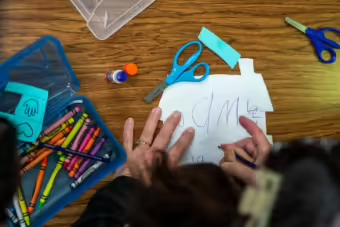
A state-funded scholarship program to encourage students to stay in Alaska for college reported its lowest eligibility numbers last year since the program began in 2010.
The Alaska Performance Scholarship is a merit-based program that funds post-secondary education for Alaska students attending school in-state. Students who take the scholarship are more likely to stay and build a career in Alaska than those who don’t, according to a report released this month.
Lawmakers say that’s a serious concern for a state suffering from outmigration and a shrinking labor pool.
“We know we have a workforce shortage. We know we want our students to stay in state. And this is a solution to that,” said Rep. Andi Story, a Juneau Democrat.
Story has a bill moving through the legislature this session to make it easier for students to access the scholarship. This year’s the scholarship’s outcomes report found that only 17% of the class of 2022 was eligible for the scholarship — the lowest rate since the program’s inception.
In rural parts of the state, the eligibility rate is even lower — just 9% in western and northern Alaska.
“The number one barrier that students said was the requirement for the standardized test — an SAT or an ACT. And it especially appears to be affecting our rural students,” said Sana Efird, executive director of the state Commission on Postsecondary Education, which administers the scholarship.
Institutions nationwide are rethinking the value of standardized test scores in college applications, and many have dropped the requirement altogether. In Alaska, Efird said rural students often have to travel to take standardized tests, which adds extra costs, planning and time.
At the same time, nearly half of scholarship-eligible students are choosing to attend school out of state instead of in Alaska. Efird says that’s in part because of funding uncertainty in the University of Alaska system.
“Reductions and cuts to our university programs over the past few years have an effect on families and students,” she said. “There were concerns saying, ‘well, we might start a program and then it gets cut, or it may not continue.’”
Story’s bill would make several changes to the program to encourage more students to take advantage of it. It would remove the standardized testing requirement. Students would be judged on course load rigor and GPA instead.
It would also increase the amount of scholarship money, which hasn’t happened since 2011. Meanwhile, tuition at the University of Alaska Anchorage has increased by 50 percent in that time.
The bill would also let students know in their junior year whether they are on track to receive the scholarship, instead of waiting until the end of their senior year, when many have already made their college decisions.
Story said these changes and others will help raise scholarship use rates in the short term. But long term, she said students need more support to prepare them for postsecondary studies and make them aware of scholarship opportunities.
“The key thing is we have to get more families aware of that, and a lot of our districts haven’t had guidance counselors — haven’t had or are cutting back on them,” Story said.
Story’s bill is still moving through committees, along with partner legislation sponsored by Sens. Forrest Dunbar and Elvi Gray-Jackson. Story said she’s heard positive feedback from her colleagues for her bill but still has some work to do to get enough support for it to pass.


